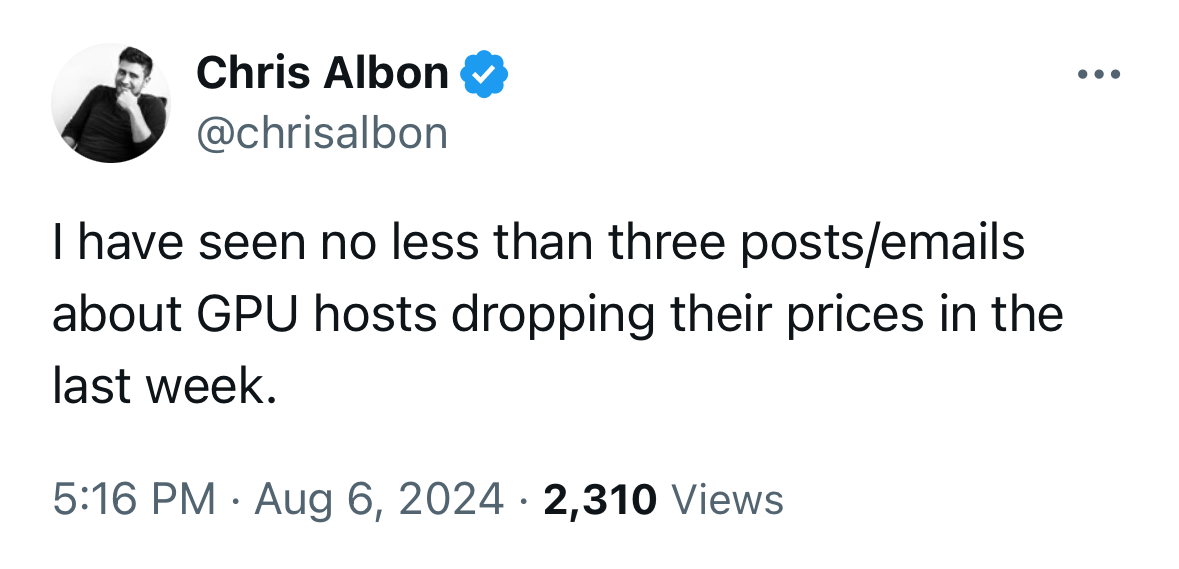How to Build a Bigger Bubble

Cloud platforms are distorting the market
Last week, on the heels of both Elliott and Goldman Sachs suggesting AI is likely a bubble, Casey Newton wrote a nice piece listing arguments why AI is (or may not be!) a bubble.
This recent vibe shift has many strong arguments for why AI might be a bubble, but none adequately address the how.
On its own, AI would have generated significant froth. ChatGPT’s stunning arrival on the scene woke up the general public and investors to the potential of LLMs, triggering major investments. But there’s another dynamic, which I haven’t seen written up explicitly, that I suspect is amplifying the size of this bubble.
But first: I’m not a financial expert, this article isn’t financial advice, and I could be wrong! If you think so, please tell me why.
With that out of the way, here’s my recipe for creating a supersized AI bubble:
- Be a giant cloud computing company with tons of cash on hand.
- Invest billions of dollars in companies building foundation models.
- As part of your investment, require these companies to build their models on your cloud platform.
- Recognize a majority of your investment as booked cloud computing revenue while also noting your investment(s) in the model-building company according to the new valuation you’ve set.
- Use your new cloud computing revenue to justify buying pallets of best-in-class GPUs, which you immediately rent back to the model-building company and all others caught up in the hype.
- Unintentionally inflate the valuation of the GPU company due to this giant order, adding to the general froth.
- Repeat.
The strange dynamic here is why the AI bubble differs from recent bubbles. It’s not just hype fueling investment and valuations. Microsoft, Amazon, and Google are distorting the market because funding Anthropic or OpenAI isn’t just an investment, it’s revenue. A dollar invested by a cloud platform is valued in a way that normal VCs can’t dream of achieving.
As a result of this cycle, large cloud platforms represent more than half of Nvidia’s data center revenue. If (when) this cycle breaks down, a significant engine of Nvidia’s growth evaporates.
Which begs the question: what might be the stick in the spoke of this cycle? What could stop it?
Investor Pressure on cloud platforms might do it. Elliott and Goldman are only the beginning of the vibe shift. Without new use cases, investors could coalesce around Elliott’s position that AI use cases are, “never going to be cost-efficient, are never going to work right, will take up too much energy, or will prove to be untrustworthy.” If the juice isn’t worth the squeeze – cloud revenues from investing in model builders can’t overcome analyst pressure from rising capex – the tech giants will dial back funding and cancel upcoming GPU orders.
Cratering start-up valuations might change the math. If the smaller AI startups (basically everyone who isn’t OpenAI, Anthropic, or backed by a nation-state) start to capitulate to lower valuations because they haven’t found their use cases before their GPU budgets run out, we’re going to see 2nd tier AI investors (everyone who isn’t a cloud platform) start to get cold feet. Can the cloud platforms sustain the bubble by themselves? Maybe. Would they prefer not to try? Definitely.
Nvidia stumbling could disrupt the ecosystem. If the above forces slowly bite, you could see an outsized impact Nvidia’s finances. Their customer concentration with cloud platforms amplifies any small moves. And given their soaring heights, partially fueled by continual wins and partially fueled by vibes, the drop could be severe.
Not helping is that while models aren’t getting smarter, they are getting more efficient. We don’t need the comical requirements we once did to fine-tune or run really good models.
I’ll be watching Nvidia’s upcoming earnings report, on August 28th. They might still have a beat in them, but there are plenty of potential catalysts to disrupt the cycle and few hopes of amplifying it.
Sidenote
It's tremendously ironic that the AI use case currently generating the most real-world value is coding assistance. Tools like Github Copilot are delivering major productivity gains, which each cloud provider is directly benefiting from. Understandably the hype is high within these companies!
The trillion-dollar question is, as Newton notes, "Are [coding copilots] the exception to the rule — or just early in realizing the kind of productivity gains that will come to the rest of the economy over time?"
